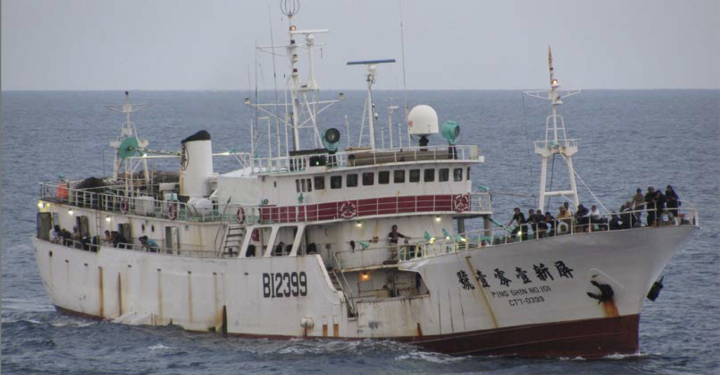THE OUTLAW OCEAN PODCAST
Episode 1: How the mystery of a massacre at sea was solved and ended in a conviction

Crimes like this don’t often happen on land. A 10-minute slow-motion slaughter captured by a cellphone camera shows a group of unarmed men at sea in an undisclosed location — possibly 15 of them — shot one by one by a semiautomatic weapon, after which the killers pose for celebratory selfies. Find out more in Episode 1 below.
This case shows the challenge of prosecuting crimes on the high seas. There were at least four ships on the scene, but no law required any of the dozens of witnesses to report the killings — and no one did. Law enforcement in the open ocean is limited and jurisdiction is complicated. Authorities learned of the killings only when the video turned up on a cellphone left in a taxi in Fiji in 2014.
It’s still unclear who the victims were or why they were shot. An unknown number of similar killings take place each year — deckhands on the ship from which the video was shot said later they’d witnessed a similar slaughter a week before.
After receiving the video from a source at Interpol in an email with the subject line, “Brace yourself”, The Outlaw Ocean Project — a non-profit journalism organisation based in Washington DC — started an investigation that resulted in the 2021 conviction of Wang Feng Yu, the captain of the Taiwanese-flagged Ping Shin 101, who was taken into custody by the Taiwanese coast guard in 2020.
The details of this investigation are chronicled in this first dramatic episode of the new podcast series, The Outlaw Ocean, from CBC Podcasts and the LA Times. Listen to it here:
Trygg Mat Tracking, a Norwegian research firm that focuses on maritime crime, identified the Ping Shin 101 by comparing video footage with images in a maritime database. Former deckhands were identified through Facebook postings and on other social media platforms where they had discussed their time onboard.
Interviews with these former deckhands, some of whom said they witnessed the killings captured in the video, revealed the name of the captain and details of the incident.
Taiwanese officials, presented with the names of the men and ships in 2015 and 2016, said the victims appeared to be part of a failed pirate attack. But maritime security analysts cautioned that the claim of piracy has been used to justify attacks undertaken to counter a range of offences, real or otherwise. The victims, they said, might have been crew members who had mutinied, thieves caught stealing or simply rival fishermen.
Visit Daily Maverick’s home page for more news, analysis and investigations
Such killings will continue to go unchecked without better tracking of offshore violence, more transparency from flag registries and fishing companies, and more effort by governments to prosecute the perpetrators. And that matters, because what occurs at sea affects everyone.
By some estimates, upwards of 90% of world trade is moved by sea, and seafood is a major source of protein for much of the world.
The Ping Shin 101 sank on 7 July 2014, less than two years after the shootings. Wang, still the captain at the time, broadcast a distress signal citing a mechanical failure.
Taiwanese authorities issued an arrest warrant for Wang in December 2018. In August 2020, prosecutors got their break. A tuna longliner called the Indian Star, owned by a Taiwanese company and flagged to the Seychelles, arrived in Kaohsiung, a city on Taiwan’s southwestern coast. The fishing ship had a history of violations, including using forged licences and fishing in forbidden areas.
More important to authorities, though, was the man who captained the vessel. Wang Feng Yu stepped ashore and, eight years after allegedly shouting the orders to kill in that grainy video, was finally arrested.
The captain was tried, convicted and sentenced to 26 years in prison for the murders, bringing a dramatic end to the investigation. DM/OBP
Episode 2 will be released next week.
Ian Urbina is the director of The Outlaw Ocean Project, a non-profit journalism organisation based in Washington DC that focuses on environmental and human rights concerns at sea globally.


















 Become an Insider
Become an Insider
Comments - Please login in order to comment.